
Antoine Caliste Domino Jr., known as Fats Domino, was an American singer-songwriter and pianist. One of the pioneers of rock and roll music, Domino sold more than 65 million records. Born in New Orleans to a French Creole family, Domino signed to Imperial Records in 1949. His first single "The Fat Man" is cited by some historians as the first rock and roll single and the first to sell more than 1 million copies. Domino continued to work with the song's co-writer Dave Bartholomew, contributing his distinctive rolling piano style to Lloyd Price's "Lawdy Miss Clawdy" (1952) and scoring a string of mainstream hits beginning with "Ain't That a Shame" (1955). Between 1955 and 1960, he had eleven Top 10 US pop hits. By 1955, five of his records had sold more than a million copies, being certified gold.

New Orleans rhythm and blues is a style of rhythm and blues that originated in New Orleans. It was a direct precursor to rock and roll and strongly influenced ska. Instrumentation typically includes drums, bass, piano, horns, electric guitar, and vocals. The style is characterized by syncopated "second line" rhythms, a strong backbeat, and soulful vocals. Artists such as Roy Brown, Dave Bartholomew, and Fats Domino are representative of the New Orleans R&B sound.

David Louis Bartholomew was an American musician, bandleader, composer, arranger, and record producer. He was prominent in the music of New Orleans throughout the second half of the 20th century. Originally a trumpeter, he was active in many musical genres, including rhythm and blues, big band, swing music, rock and roll, New Orleans jazz, and Dixieland. In his induction into the Rock and Roll Hall of Fame, he was cited as a key figure in the transition from jump blues and swing to R&B and as "one of the Crescent City's greatest musicians and a true pioneer in the rock and roll revolution".

"Burning Love" is a 1972 song by Elvis Presley, written by Dennis Linde, originally released by Arthur Alexander earlier in 1972. Presley found major success with the song, it becoming his final Top 10 hit in the American Hot 100 or pop charts, peaking at number 2.

"A Big Hunk o' Love" is a song originally recorded by Elvis Presley and released as a single on June 23, 1959 by RCA Victor, which topped the Billboard Hot 100 for two weeks.
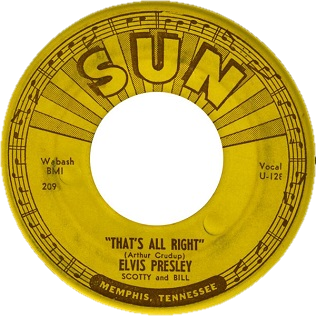
"That's All Right" is a song written and originally performed by the American blues singer Arthur Crudup, and recorded in 1946. It was rereleased in early March 1949 by RCA Victor under the title "That's All Right, Mama", which was issued as RCA's first rhythm and blues record on its new 45 rpm single format.
"Blue Monday" is a song written by Dave Bartholomew, first recorded in 1953 by Smiley Lewis and issued as a single, in January 1954, on Imperial Records. The single, with a slow-rocking beat, features an instrumental electric guitar solo by Lewis.

Overton Amos Lemons, known as Smiley Lewis, was an American New Orleans rhythm and blues singer and guitarist. The music journalist Tony Russell wrote that "Lewis was the unluckiest man in New Orleans. He hit on a formula for slow-rocking, small-band numbers like 'The Bells Are Ringing' and 'I Hear You Knocking' only to have Fats Domino come up behind him with similar music with a more ingratiating delivery. Lewis was practically drowned in Domino's backwash."
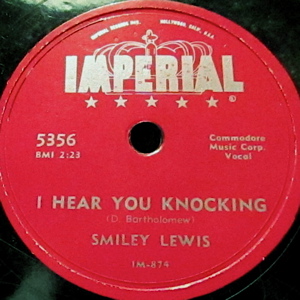
"I Hear You Knocking" is a rhythm and blues song written by American musician Dave Bartholomew. New Orleans rhythm and blues singer Smiley Lewis first recorded the song in 1955. The lyrics tell of the return of a former lover who is rebuffed.

"Good Rocking Tonight" is a jump blues song originally released in 1947 by its writer, Roy Brown and was covered by many recording artists. The song includes the memorable refrain, "Well I heard the news, there's good rocking tonight!" The song anticipated elements of rock and roll music.
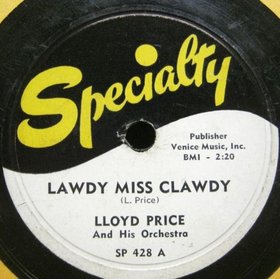
"Lawdy Miss Clawdy" is a song by New Orleans singer-songwriter Lloyd Price that "grandly introduced The New Orleans Sound". It was first recorded by Price in 1952 with Fats Domino and Dave Bartholomew during his first session for Art Rupe and Specialty Records. The song became one of the biggest selling R&B records of 1952 and crossed over to other audiences. "Lawdy Miss Clawdy" inspired many songs and has been recorded by a variety of artists.

Elvis' Gold Records Volume 4 is a greatest hits album by American rock and roll singer Elvis Presley, issued by RCA Victor in mono and stereo, LPM/LSP 3921, in January 1968, with recording sessions taking place over an eight-year span at RCA Studio B in Nashville, Tennessee, and at RCA Studios and Radio Recorders in Hollywood. It is a compilation of hit singles released between 1961 and 1967, peaking at number 33 on the Billboard 200. It was certified Gold on March 27, 1992, by the Recording Industry Association of America.
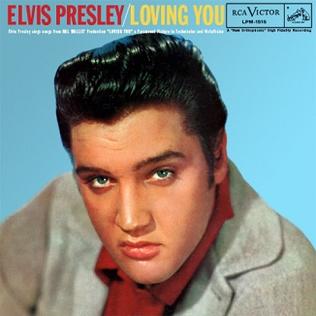
Loving You is the first soundtrack album by American rock and roll singer Elvis Presley. It was released by RCA Victor in mono, LPM 1515, in June 1957 to accompany his film, Loving You (1957). Recording sessions took place on January 15, 16, 17, and 18, 1957, at the Paramount Pictures Scoring Stage, and on January 12, 13, 19, and February 23 and 24, 1957, at Radio Recorders in Hollywood. These are the first sessions where Steve Sholes is officially listed as producer. It spent ten weeks at No. 1 on the Billboard Top Pop Albums chart. It was certified Gold on April 9, 1968 by the Recording Industry Association of America.

"I Got Stung" is a 1958 song recorded by Elvis Presley and released as a single written by Aaron Schroeder and David Hill and published by Elvis Presley's company Gladys Music, Inc. It was a number one hit in the UK in 1959 and again in 2005 as a double A-side single.
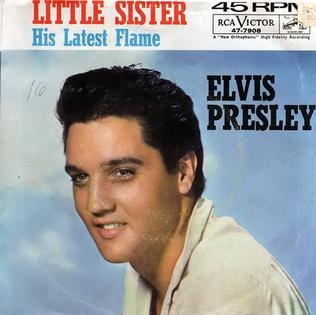
"Little Sister" is a rock and roll song written by Doc Pomus and Mort Shuman. It was originally released as a single in 1961 by American singer Elvis Presley, who enjoyed a No. 5 hit with it on the Billboard Hot 100. The single also reached No. 1 in the UK Singles Chart. Lead guitar was played by Hank Garland and the rhythm guitar was played by Scotty Moore with backing vocals by the Jordanaires featuring the distinctive bass voice of Ray Walker.

"You'll Be Gone" is a song recorded by Elvis Presley and published by Elvis Presley Music and released in 1965 on the Girl Happy soundtrack album and as a 45 single. The song was recorded in 1962 and was one of very few which Presley was involved in writing; his co-writers were his bodyguard Red West and Charlie Hodge. The other song that Elvis Presley composed was "That's Someone You Never Forget" in 1961 with Red West, which was on the Pot Luck LP released in 1962. The song was recorded on Sunday, March 18, 1962, at RCA Studio B in Nashville, Tennessee.

Fun in Acapulco is the seventh soundtrack album by American singer and musician Elvis Presley, released on RCA Victor Records in mono and stereo, LPM/LSP 2756, in November 1963. It is the soundtrack to the 1963 film of the same name starring Presley. Recording sessions took place at Radio Recorders in Hollywood on January 22 and 23 and February 27, 1963; and at RCA Studio B in Nashville, Tennessee, on May 26 and 28, 1963. It peaked at number three on the Billboard Top Pop Albums chart.
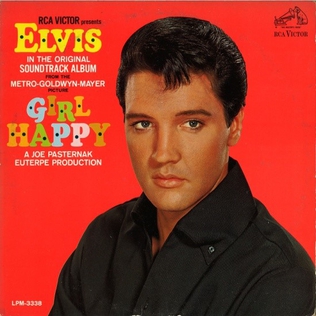
Girl Happy is the tenth soundtrack album by American singer and musician Elvis Presley, released on RCA Victor Records in mono and stereo, LPM/LSP 3338, in March 1965 – the March 1 date is disputed. It is the soundtrack to the 1965 film of the same name starring Presley. Recording sessions took place at Radio Recorders in Hollywood, California, on June 10, 11, 12, and vocal overdubs by Presley on June 15, 1964. It peaked at number eight on the Top LP's chart. It was certified Gold on July 15, 1999 by the Recording Industry Association of America.

The singles discography of Elvis Presley began in 1954 with the release of his first commercial single, "That's All Right". Following his regional success with Sun Records, Presley was signed to RCA Victor on November 20, 1955. Presley's first single with RCA, "Heartbreak Hotel", was a worldwide hit, reaching the No. 1 position in four countries and the top 10 in many other countries. Other hit singles from the 1950s include "I Want You, I Need You, I Love You", "Don't Be Cruel", "Hound Dog", "Love Me Tender", "Too Much", "All Shook Up", "(Let Me Be Your) Teddy Bear", "Jailhouse Rock", "Don't", "Wear My Ring Around Your Neck", "Hard Headed Woman", "One Night", "(Now & Then There's) A Fool Such as I", and "A Big Hunk o' Love". On March 24, 1958, Presley entered the United States Army at Memphis, Tennessee, and was stationed in Germany. He left active duty on March 5, 1960.
"Hot Dog" is a rockabilly song by country singer Buck Owens, initially released under the pseudonym Corky Jones in September 1956 by independent Californian country label Pep.


















